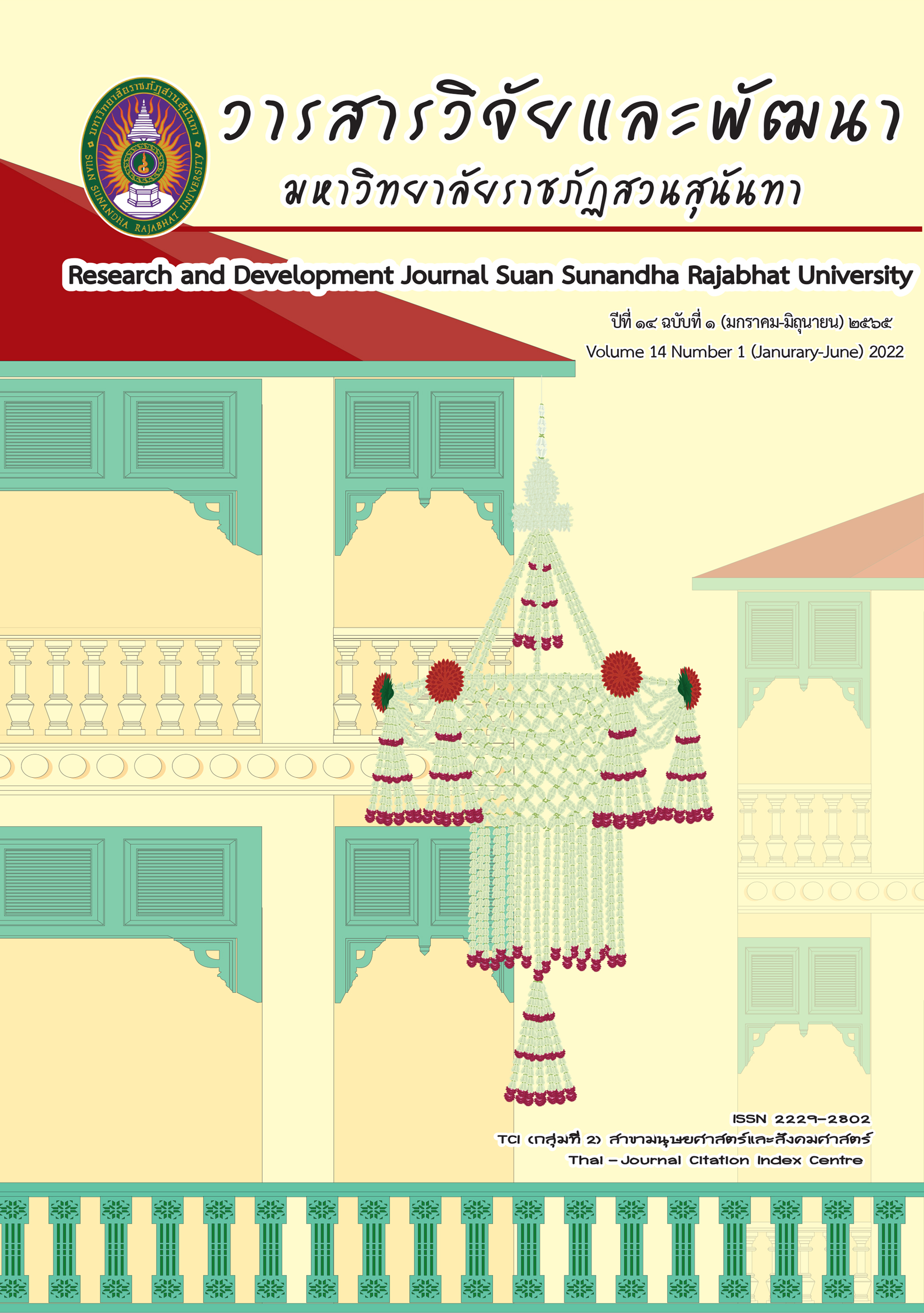Material Adaptation and Implementation to Enhance Intercultural Knowledge and Translation Skills of Non-English Major College Students in China
คำสำคัญ:
intercultural knowledge, material adaptation, implementation, translation skillบทคัดย่อ
Intercultural knowledge is vital in learning and using foreign languages effectively. This study was designed to develop the materials to enhance intercultural knowledge of non-English major college students in China and then, explore their effectiveness. The mixed methodology which combines qualitative analysis and quantitative analysis was utilized to analyze the data from questionnaires, translation competency of the students, and in-depth interviews on students’ reflections towards the adapted materials. There were 98 students participating in this study in the academic year 2019 to 2020. After the new intercultural teaching material development and implementation, apparently the students’ intercultural knowledge had been increased significantly based on the comparison of the questionnaires. The students’ performance on translation competency was at a high level and their perceptions from the in-depth interviews revealed positive attitudes. On this basis, this study suggests the way to adapt and implement teaching materials effectively to enrich the students’ intercultural knowledge and strengthen their language ability.
เอกสารอ้างอิง
Ang, S. (2007). Personality correlates of the four-factor model of cultural intelligence. Group & Organization Management, 31(1), 100–123. doi:10.1177/ 1059601105275267
Bagheridoust, E., & Mahabad, Z. M. (2017). Translation of culture specific items: A case study of Persian architecture terminology. International Journal of Applied Linguistics & English Literature, 6(2), 46-55. doi:10.7575/aiac.ijalel.v.6n.2p.46
Charunsri, K. (2019). The challenges of implementing content language integrated learning in tertiary education in Thailand: A review and implication of materials. Advances in Language and Literary Studies, 10(4), 125-129. doi:10.7575/aiac.alls.v.10n.4p.125
Coombe, C., Hossein, V., & Hassan, M. (2020). Language assessment literacy: What do we need to learn, unlearn, and relearn. Language Testing in Asia, 10(1). doi:10.1186/s40468-020-00101-6
Dagbaeva, N. Z., Samoshkina, J. S., & Tzybenova, S. G. (2020). Components of modern students’ intercultural competence: Comparative analysis. European Journal of Contemporary Education, 9(1), 19–28. doi:10.13187/ejced.2020.1.19
Evtyugina, A., Zhuminova, A., Grishina, E., Kondyurina, I., & Sturikova, M. (2020). Cognitive-conceptual model for developing foreign language communicative competence in non-linguistic university students. International Journal of Cognitive Research in Science, Engineering & Education (IJCRSEE), 8, 69–77. doi:10.23947/2334-8496-2020-8-SI-69-77
Frolikova, A. S. (2020). Model of universal competence development intercultural interaction of bachelors by means of fine arts. European Journal of Contemporary Education, 9(1), 29–42. doi:10.13187/ejced.2020.1.29
Gambier, Y., & Van Doorslaer, L. (2010). Handbook of Translation Studies, Volume 1. Amsterdam/Philadelphia: John Benjamins Publishing Company.
Hong, S. (2018). On the impact of cultural context on pragmatic failures in the Chinese-English intercultural communication: A contrastive analysis. International Forum of Teaching & Studies, 14(2), 34–38.
Marković, L., & & Lazarević, N. (2020). A space for the translator(s): Situating student translators in real-life shoes. Journal of Contemporary Philology, 3(1), 35–52. doi:10.37834/JCP2030035m
Parsons, R. L. (2010). The effects of an internationalized university experience on domestic students in the United States and Australia. Studies in International Education, 14(4), 313-334.
Peters, S. U. (2015). Exploring the effectiveness of collaborative assessment preparation with immediate feedback in an intensive adult English as a second language classroom (Order No. 3705904). Retrieved from Publicly Available Content Database: http://search-proquest-com-s.ncu1. naihes.cn/ docview/ 1692083704? accountid=33011
Rehman, M., & Umar, H. (2019). Source culture and target culture in English language teaching: A study of intercultural pragmatics and students’ learning outcomes. Pakistan Journal of Education, 36(1).
Sakurauchi, Y. H. (2014). Teaching and learning for intercultural sensitivity: A cross-cultural examination of American domestic students and Japanese exchange students. Doctoral dissertation: Portland State University.
Tomalin, B., & Stempleski, S. (1998). Cultural Awareness. New York: Oxford University Press.
Vallejo, I. M. (2018). Materials to develop intercultural communicative competence in an EFL context. . Colombia: Master’s thesis, Universidad Externado de Colombia, School of Education.
Wilberschied, L. F. (2015). Intercultural communicative competence: Literature review. Cultural Encounters, Conflicts, and Resolutions: Vol. 2: Iss. 1, Article 4.
Zhou, Y. (2011). A study of Chinese university EFL teachers and their intercultural competence teaching. Canada: Doctoral dissertation, University of Windsor.
ดาวน์โหลด
เผยแพร่แล้ว
รูปแบบการอ้างอิง
ฉบับ
ประเภทบทความ
สัญญาอนุญาต
ลิขสิทธิ์ (c) 2022 มหาวิทยาลัยราชภัฏสวนสุนันทา

อนุญาตภายใต้เงื่อนไข Creative Commons Attribution-NonCommercial-NoDerivatives 4.0 International License.
บทความที่ได้รับการตีพิมพ์เป็นลิขสิทธิ์ของ สถาบันวิจัยและพัฒนา มหาวิทยาลัยราชภัฎสวนสุนันทา
ข้อความที่ปรากฏในบทความแต่ละเรื่องในวารสารวิชาการเล่มนี้เป็นความคิดเห็นส่วนตัวของผู้เขียนแต่ละท่านไม่เกี่ยวข้องกับมหาวิทยาลัยราชภัฎสวนสุนันทา และคณาจารย์ท่านอื่นๆในมหาวิทยาลัยฯ แต่อย่างใด ความรับผิดชอบองค์ประกอบทั้งหมดของบทความแต่ละเรื่องเป็นของผู้เขียนแต่ละท่าน หากมีความผิดพลาดใดๆ ผู้เขียนแต่ละท่านจะรับผิดชอบบทความของตนเองแต่ผู้เดียว





